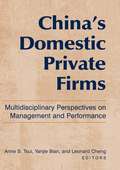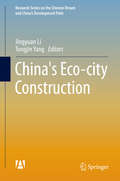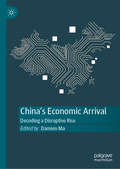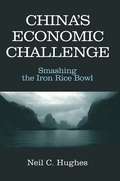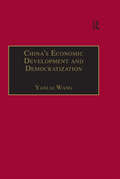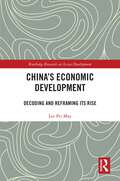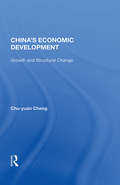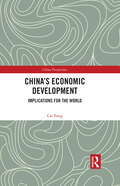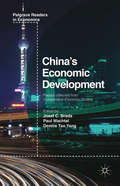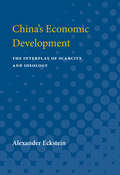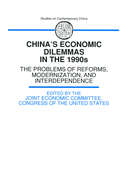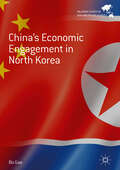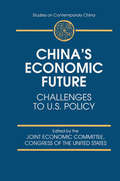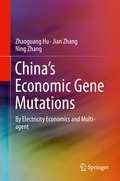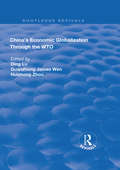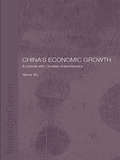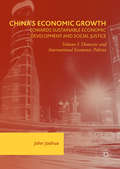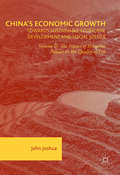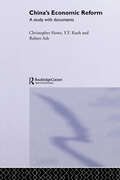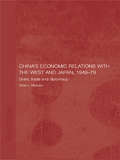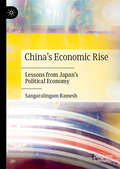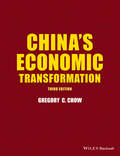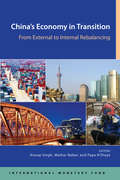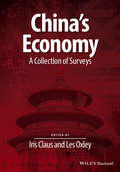- Table View
- List View
China's Domestic Private Firms: Multidisciplinary Perspectives on Management and Performance
by Anne S. Tsui Yanjie BianOne of the most important outcomes of market reforms in China over the past 20 years has been the emergence of a significant domestic private sector, which now accounts for almost a third of China's GDP and is by far the country's most important source of employment growth. This book is the first in-depth analysis of the management and operation of these domestic private firms, which are defined as companies or organizations created by PRC citizens, including township enterprises and collectives. The book provides a comprehensive and multidisciplinary perspective on the factors important to the successful operation and growth of these firms. It begins with a review of the literature on the topic in three different disciplines - economics, sociology, and management - each followed by several chapters covering recent developments in these areas. Featuring contributions by distinguished scholars and China experts, the work concludes with an insightful chapter on the future of China's public sector in the global economy.
China's Eco-city Construction (Research Series on the Chinese Dream and China’s Development Path)
by Jingyuan Li Tongjin YangThis book introduces the concept of Eco-civilization, highlights the construction and development of eco-cities in China, and assesses the achievements and shortcomings of China's eco-city construction projects. As both China and Western countries face an impending ecological crisis, responding to that crisis is a common challenge for all human beings. There is an overwhelming consensus among Chinese scholars that in order to successfully address the ecological crisis successfully we must establish an eco-civilization, and one important step toward accomplishing that goal is to plan and construct eco-cities.
China's Economic Arrival: Decoding a Disruptive Rise
by Damien MaThis book is a collection of essays from MacroPolo, the think tank of the Paulson Institute in Chicago. The picture of China that emerges in this volume is one built from the ground up, across economics, politics, and technology. In addition, because China’s rise has important global dimensions, a US-China section composed of two essays is included, which combine both a macro perspective and a view of the bilateral relationship through the history of a significant multinational firm. Finally, this volume will include an original introduction and conclusion by Damien Ma, editor and co-founder of MacroPolo. The essays are analytically driven and provide novel perspectives, context, granular data, and policy conclusions that get lost in the daily churn of news cycles. None of the essays in this volume focuses on national security or geopolitics. Rather, the volume grapples squarely with how China’s domestic economic, political, and technological developments have transformed not only itself but also the world at large.
China's Economic Challenge: Smashing the Iron Rice Bowl
by Neil C. HughesThis book lays bare the reality behind China's efforts at economic modernization by showing: (1) what is happening to the industrial forces that help shape the economy; (2) how economic agents have behaved; (3) what government intentions really are; and (4) how the transition from a centralized to a market-oriented economy has been filled with contradictions and difficult choices. The author examines issues such as China's WTO membership; the Three Gorges Project; the widening differences between the urban and rural areas; the government's efforts to protect its own interests and maintain stability; the impact of reform; and the situation facing state enterprises, the banking system, the agricultural sector, and the environment.
China's Economic Development and Democratization (The Chinese Trade and Industry Series)
by Yanlai WangChina's Economic Development and Democratization examines China's transformation from an institutional perspective. It proposes an analytical framework comprising six macro institutional environments: international, ideological, political, economic, constitutional, and civil-social, to analyze the Chinese transition. Through an institutional analysis of the ruling elite’s policy institutionalization, it tries to answer three main questions: Will China’s economic reforms lead to a meaningful political reform? Will economic freedom lead to political freedom? Will economic development lead to political democratization? The major findings from the institutional analysis of the dynamic interactions between political actors and institutions suggest that China is moving closer towards democracy. Students and scholars who are studying or conducting researches on the Chinese economy, society or politics will find this book of particular interest.
China's Economic Development: Decoding and Reframing its Rise (Routledge Research on Asian Development)
by Lee Pei MayThrough a rigorous examination of “China’s rise”, Lee addresses an important question—Did China catch up? Or more specifically, can growth be automatically translated to catching up with the advanced industrialised countries or has it only allowed limited progress (if any) to be made?To answer these queries and the broader question of the possibility of the Global South converging with the Global North, four development theories are utilised, with competing explanations, to uncover the complexity and multifaceted development of China. This includes whether China really has a unique developmental model to offer. Positioning China within the global economy, this book traces its developmental progress over time as well as its progress relative to other countries. To understand whether the Chinese political economy is socialist (or not), Lee moves away from the orthodox definition of socialism and instead examines the official narrative of Socialism with Chinese Characteristics. Lastly, this book argues that though China is catching up, challenges that could potentially block China’s progress for a full catch‑up are to be anticipated.A useful resource for students and scholars in the fields of international relations, international political economy, Chinese studies, and development studies.
China's Economic Development: Growth And Structural Change
by Chu-yuan ChengHow has the government of the PRC transformed traditional economic institutions into a socialist, central-planning system? What has been the impact of this transformation on China's economic growth? What is the essence of the Chinese development model and how successfully has it functioned during the past three decades? What are the prospects for t
China's Economic Development: Implications for the World (China Perspectives)
by Cai FangCai Fang is one of China’s most distinguished economists. This book elucidates the worldwide significance of China’s economic development over the past 70 years from the perspectives of economic history and growth theory.The Chinese economy has undergone an unprecedented period of growth and development since the reform and opening-up in the late 1970s; a process which the hallmarks of neoclassic economic theory have often proved inadequate to explain. Examining the Chinese economy in the light of Chinese history and the development of the world economy as a whole, the book charts the milestones and critical reforms of China’s economic development, providing insights into unique attributes as well as more generic patterns. The discussion covers multiple hot topics in the field, including the so-called Great Divergence, dual-sector economic development, real-world experience of the reform and opening-up, rural reform, urbanization, economic reform, poverty reduction, the latter day slowdown of China’s economic growth, and China¡¯s role in and response to globalization, global supply domination and other headwinds.The book will be a must-read for students, scholars and general readers interested in the Chinese economy, economic development, political economy, and development economics.
China's Economic Development: Past And Present (Palgrave Readers in Economics)
by Dennis YangThis collection of papers is from Palgrave's journal Comparative Economic Studies, carefully selected by a team of expert editors, this volumes collates the most sophisticated works to provide the readers with an essential guide to the economic development of China.
China's Economic Development: The Interplay of Scarcity and Ideology (Michigan Studies On China)
by Alexander EcksteinChina's Economic Development: The Interplay of Scarcity and Ideology by Alexander Eckstein provides a comprehensive analysis of China's economic growth and transformation from a socialist economy. Eckstein examines the unique challenges China faced in addressing its economic backwardness, such as scarcity of resources and ideological constraints, and compares its industrialization to other countries. The book explores how Maoist ideology and policy initiatives impacted the country's economic strategies, leading to a fluctuating development pattern characterized by rapid expansion in the 1950s and stagnation in the 1960s. Key themes include the dichotomy between scarcity and ideology, the influence of historical factors on economic structures, and the adaptation to Soviet models. Eckstein sheds light on how China navigated its unique size, population pressures, and low per capita income, arguing that understanding these dynamics is crucial for both development theory and policy design. This volume, part of the Michigan Studies on China series, compiles essays and research that contribute to a nuanced understanding of China's economic systems, with particular focus on the tensions between ideological aspirations and economic realities.
China's Economic Dilemmas in the 1990s: The Problem of Reforms, Modernisation and Interdependence (Made Easy Ser.)
by The Joint The Joint Economic CommitteeMost students of contemporary China are familiar with the Joint Economic Committee studies on China, which have appeared periodically since 1967. This is the most recent study in the series (released in April, 1991). This volume follows the format of the previous studies, offering a broad sweep of its subject matter. The 50 chapters - contributed by Chinese scholars in government, universities and private research centres - are divided into five major parts. Each section begins with an overview which summarises and comments on the main points in each of the chapters. The volume offers a detailed examination of China's economy, and the political and social factors currently facing the leadership in Beijing.
China's Economic Engagement in North Korea (Palgrave Series in Asia and Pacific Studies)
by Bo GaoThis book addresses growing tensions in Northeast Asia, notably between North Korea and China. Focusing on China’s economic participation in North Korea’s minerals and fishery industries, the author explores the role of China’s sub-state and non-state actors in implementing China’s foreign economic policy towards North Korea. The book discusses these actors’ impact on the regional order in Northeast Asia, particularly in the Korean Peninsula. The project also provides a comprehensive and up-to-date account of China’s cultural and economic activities in North Korea as implemented by both the historically traditional actors in Jilin and Liaoning provinces in Northeast China, and new actors from coastal areas (Shandong and Zhejiang provinces) and inland provinces (Chongqing and Henan) to Zhejiang province. It argues that in the era of economic decentralisation, Chinese sub-state and non-state actors can independently deal with most of their economic affairs without the need for permission from the central government in Beijing. A key read for scholars and students interested in Asian history, politics and economics, and specifically the East Asian situation, this text offers an in-depth analysis of recent activity concerning the Sino-DPRK economic relationship.
China's Economic Future: Challenges to U.S.Policy (Studies On Contemporary China)
by Joint Economic Committee Congress of the United StatesThis is the latest Joint Economic Committee volume on the Chinese economy. With the current state of US-China relations and Hong Kong's accession in 1997, the study should provide policy makers in the USA with a useful tool in guiding economic policy toward China.
China's Economic Gene Mutations: By Electricity Economics and Multi-agent
by Ning Zhang Jian Zhang Zhaoguang HuThe book focuses on low-carbon issues and China's economy, which is analyzed from the perspective of electricity economics. It proposes the novel concept of an "economic gene" to reflect certain characteristics of the economy. The gene mapping of China's economy has been studied based on production functions with electricity. Economic mutations have also been studied with the aim of diagnosing problems in the economy. Two such mutations have occurred in China since 1978, the most recent being in 2012 and no further mutation is expected until 2025. The book describes the inherent quality of China's economy from 2012 to 2025, and how mechanism reforms would greatly improve marginal representative factor productivity in this period. The agents response equilibrium (ARE) approach to simulate national economy, based on multi-agent technology is proposed. Another cornerstone of the model is the input-output table. Simulated input-output tables from 2011 to 2025 are provided in the book. This book provides recommendations for policy makers and advisors, and is a valuable resource for researchers in the fields of economics, public policies, low-carbon development, electricity and energy. It also provides insights into China's economic development.
China's Economic Globalization through the WTO
by Guanzhong James WenThis title was first published in 2003. This book represents one of the recent internationally coordinated initiatives to access the rich and still unfolding implications of China's participation in economic globalization in the context of the nation's accession to the World Trade Organization.
China's Economic Growth: A Miracle with Chinese Characteristics (Routledge Studies on the Chinese Economy #Vol. 3)
by Yanrui WuThe current growth of the Chinese economy is of immense importance for the global economy. This book outlines the main characteristics of Chinese economic growth over the last two decades, and investigates in detail the key determinants of growth, especially capital formation and productivity issues. It goes on to examine the important related questions of employment and underemployment, regional disparity, and economic integration, exploring in detail how far economic integration has taken place in south China, including the economies of Hong Kong and Taiwan, and how far this integration has been a determinant of economic growth. The book makes comparisons with other East Asian economies, and concludes with a consideration of the prospects for continuing growth in the twenty-first century.
China's Economic Growth: International Spillovers
by Vivek Arora Athanasios VamvakidisA report from the International Monetary Fund.
China's Economic Growth: Volume I: Domestic and International Economic Policies
by John JoshuaThis two-volume book addresses the economic transformation occurring in China at present. The author investigates China's domestic and international policies, the impact of these policies on economic growth, and their effect on the quality of life for the people of China. In the first volume, the author distinguishes between economic growth and sustainable economic development, and discusses China's current and past economic policies towards growth. Chapters also explore the structural transformation of China's economy and its increasingly consumer-oriented nature. The second volume looks more specifically at the result of domestic policies on the quality of life for people living in China. The author examines the distribution of income, the alleviation of poverty, the Chinese education system, and the environmental cost of economic growth. These volumes will be of particular interest to researchers and scholars concerned with China's emerging economic power.
China's Economic Growth: Volume II: The Impact of Economic Policies on the Quality of Life
by John JoshuaThis two-volume book addresses the economic transformation occurring in China at present. The author investigates China's domestic and international policies, the impact of these policies on economic growth, and their effect on the quality of life for the people of China. In the first volume, the author distinguishes between economic growth and sustainable economic development, and discusses China's current and past economic policies towards growth. Chapters also explore the structural transformation of China's economy and its increasingly consumer-oriented nature. The second volume looks more specifically at the result of domestic policies on the quality of life for people living in China. The author examines the distribution of income, the alleviation of poverty, the Chinese education system, and the environmental cost of economic growth. These volumes will be of particular interest to researchers and scholars concerned with China's emerging economic power.
China's Economic Reform: A Study with Documents
by Christopher Howe Robert Ash Y. Y. KuehThis book presents a collection and analysis of original policy documents, newly translated into English, from a key period of Chinese development, providing both a current and a retrospective analysis of China's economic reform efforts. Topics dealt with include the evolution of Chinese economic strategy; economic planning and the spread of market mechanisms; technology transfer in industry; evolution of an agricultural system; the development of population policy; and foreign economic relations. The collection will be of great interest not only to scholars and students of Chinese studies, but also to professionals and social scientists concerned with China but unable to read source documents in Chinese.
China's Economic Relations with the West and Japan, 1949-1979: Grain, Trade and Diplomacy (Routledge Studies on the Chinese Economy #Vol. 14)
by Chad MitchamDuring the period 1949 to 1979, communist China was officially pursuing a policy of self-sufficiency, and the United States and its allies were officially implementing a trade embargo against communist China. However, this book, based on extensive original research, demonstrates that China was highly dependent on Western/Japanese grain imports. The text shows that groups lobbying on behalf of Western/Japanese grain producers and related industries had successfully found ways of by-passing the embargo. This book charts the complicated picture of how economic relations between China, the West and Japan developed in these years.
China's Economic Rise: Lessons from Japan’s Political Economy
by Sangaralingam RameshThis book examines the economic and political rise of China from the perspective of Japan’s economic development. Beginning with Japan’s rise to statehood in the Kamakura Period (1185 to 1333) and detailing the evolution of its economy through to 2018, parallels are drawn with the economic development of China. Many of the challenges Japan faced in the first decades of the 20th century, including nationalism, militarism, income disparities, social deprivation, and economic crisis are applicable to modern day China.China’s Economic Rise: Lessons from Japan’s Political Economy aims to detail the possible economic and political upheavals that could accompany the slowing of the Chinese economy from the experience of Japan. The book will be of interest to researchers and students in Political Economy, Economic History, Economic Transition, and Development Economics. The book supplements the other publications of the author: China’s Lessons for India: Volume 1 – The Political Economy of Development, China’s Lessons for India: Volume 2 – The Political Economy of Change and The Rise of Empires: The Political Economy of Innovation.
China's Economic Transformation
by Gregory C. ChowNow available in a fully-revised and updated third edition, this established textbook provides a penetrating and comprehensive analysis of the historical, institutional, and theoretical factors that have contributed to China’s economic success. Includes coverage of China’s foreign investments, trade with regional partners, Chinese human capital, and bureaucratic economic institutions Covers a diverse set of important issues, including environmental restraints, income distribution, rural poverty, the education system, healthcare, exchange rate policies, monetary policies, and financial regulation Accessibly written and intelligently organized to offer a straightforward guide to China’s economic evolution Written by a lauded economist, researcher, and advisor to government officials in mainland China and Taiwan
China's Economy in Transition: From External to Internal Rebalancing
by Anoop Singh Papa N'Diaye Malhar NabarA report from the International Monetary Fund.
China's Economy: A Collection of Surveys (Surveys of Recent Research in Economics #13)
by Les Oxley Iris ClausThis collection of critical surveys provides readers with a range of up-to-date work from leading scholars in the area, writing on some of the key issues facing China, as they survey the present and future challenges of the Chinese economy Nine papers provide detailed discussion on key aspects of the past, present and future of the Chinese economy Leaders in their relevant fields of scholarship tackle some of the critical issues facing China Contributors identify common themes, including the household registration system, urbanization, demographic transition, inequality and the sustainability of economic growth Articles provide a critical review of the literature and discuss policy implications and areas for future research
